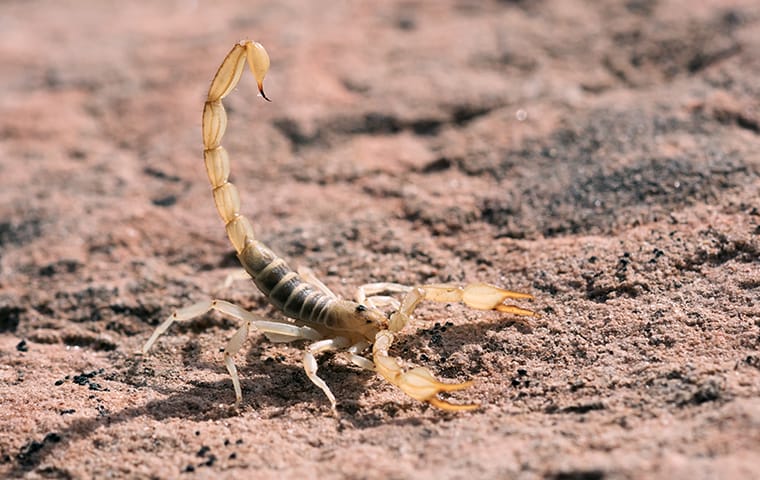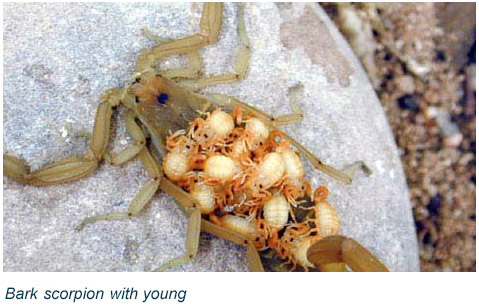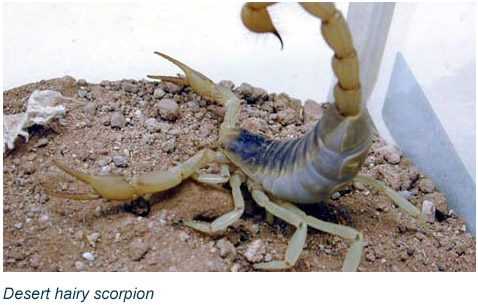Scorpion Identification & Prevention Guide
What are scorpions?
Scorpions belong to the class Arachnida, the same class as mites, spiders, and ticks. These nocturnal predators have four pairs of legs, a single pair of pincers, and long, segmented tails that curve over their bodies and end with a sharp stinger. Scorpions use their powerful pincers and stingers to capture prey, injecting a potent venom and paralyzing it. They have poor vision and rely on touch and vibrations to hunt. Female scorpions produce live young that they will carry on their back for up to 15 days.
Are scorpions dangerous?
Scorpion stings are excruciating and, like bee stings, can cause localized swelling and an intense burning sensation. The venom they produce is potent enough to trigger allergic reactions and sometimes even life-threatening anaphylaxis. In the United States, the bark scorpion has venom that is strong enough to be potentially fatal.
Why do I have a scorpion problem?
Scorpions are nocturnal and like to hide in dark, secluded spots during the day. Unfortunately, most residential properties have places they can hide such as trees, woodpiles, rocks, and logs. They are also great climbers and like to scale walls or any rough surface they come across. Properties with a lot of insect activity are desirable to scorpions. Like any pest, scorpions make themselves at home anywhere there is easy access to food and often find their way into homes, garages, and other structures while foraging for food.
Where will I find scorpions?
Outdoors, scorpions hide in dark, damp, and secluded areas where they will wait for their prey (insects, small rodents, spiders, and lizards) to come by so that they can subdue them. Scorpions that move inside chose to hide in places that mimic their outdoor environment; basements, bathrooms, closets, crawlspaces, and laundry rooms are their top choices.
How can I prevent scorpions in the future?
In addition to our professional services, the following prevention tips will help you to prevent problems with scorpions in your home or business:
Use dehumidifiers in the basement, ventilate crawlspaces, and fix leaky pipes to reduce moisture levels indoors.
Seal cracks in the foundation and exterior walls of your home or business.
Install door sweeps on exterior doors.
Wipe excess moisture our of sinks and bathtubs.
Create a barrier of crushed rock or stone between your property and any mulch, soil, or grass.
Remove piles of leaves, fallen trees or tree limbs, excess woodpiles, and other organic debris from your property where scorpions can hide.

Scorpions – a hard-to-kill stinger
Scorpions are nuisance pests known to sting as a defense mechanism or as a way to kill prey. A handful of species like the bark scorpion, which is found in your region, possess more dangerous venom, which can be fatal to humans.
Scorpions are becoming a prevalent pest, especially in the southwest United States, which appears to be the result of the increasing urban encroachment into the scorpions’ natural habitat. Scorpions are predatory and will enter homes in search of harborage and food such as crickets and roaches. There are over 70 species in the United States, but less than 10 species are considered urban pests.
Scorpions are related to spiders as they have just two body segments; an abdomen and a cephalothorax (combined head and thorax). The abdomen terminates in a tail containing a stinger, while the cephalothorax has two chelicerae to chew prey and two pedipalps (pincers) to grasp prey. Young scorpions begin life as first instar nymphs, which crawl to the mother’s back and remain there 7-30 days until the first molt.
The species of urban importance are the desert harry scorpion (Hadrurus arizonensis); Devil’s scorpions (Vejovis spp.); and the bark, common striped, and margarite scorpions (Centruroides sp ). Most stings from scorpions cause short-term pain, swelling or slight discoloration, but allergic reactions can be more severe. The most dangerous species in the United States is the bark scorpion, whose neurotoxic venom can cause hyperactivity, anxiety, numbness radiating from the point of envenomization, respiratory distress, dizziness, and death within two to 24 hours after the time of stinging. Morphine should not be administered, since it will synergize the effects of the venom. Antivenom is effective if administered within two hours after stinging.
The following five-step approach should be followed when addressing a scorpion problem.
Inspection // Check for harborages both indoors and outdoors. Scorpions will reside under debris such as wood piles and rocks during the day. Place sticky traps along walls inside suspected areas. Check under boxes, furniture and carpets, as well as attics, vents and light voids in ceilings. At night when scorpions are active, scorpions can be observed with an ultraviolet light as they will fluoresce.
Elimination of Harborage // Remove wood piles, landscape timbers, and rocks near the structure. Inside, where scorpions have been seen, move boxes and other objects that may serve as refuges off the ground.
Exclusion // Ensure that door thresholds are tight. Windows should have tight-fitting screens. If the weep screed is open, be sure that the screen is in good order. Frames, vents, utility pipe entrances, fascia boards should be sound and caulked, if necessary.
Food/Prey Reduction // Establish an 18-inch grass-free perimeter band around the structure. Use a perimeter pesticide application to eliminate insect prey.
Pesticide application // If scorpions are inside the structure, applications should be made behind appliances, along walls, in wall and ceiling voids housing lights and vents, attic areas, and crawl spaces.

SCORPIONS
Scorpions are often feared for their painful and poisonous stings. They’re typically not aggressive, but will attack if they are accidentally touched or feel threatened. Learn where scorpions live, how to help keep scorpions away, and get tips to help protect your family from these stinging creatures.
Scorpions are most active at night.
While many people think of scorpions as desert dwellers, these creatures are equipped with incredible survival skills that enable them to live in a variety of environments. In fact, scorpions are found on every continent in the world
Scorpions must have water to live, but can survive for months without food.
Similar to other arachnids like spiders, scorpions have two body regions and eight legs
WHAT SCORPIONS EAT
Scorpions eat other small creatures, including spiders, crickets, centipedes, and caterpillar
WHERE SCORPIONS LIVE
Scorpions can be found under rocks, woodpiles, or other debris.
Indoors, they are often found hiding in dark, secluded areas
WHAT ATTRACTS SCORPIONS
Scorpions enter your home looking for food, as well as a secluded or quiet place to hide and escape the heat

Help get rid of Scorpions – have dogs
First, I don’t want to sound mean to the other posters but I have a great deal of experience with scorpions… scorpions do not have eggs, they give live-birth to as many as 32 young and mom carries them on her back for a week or two afterwards till they are big enough to get along on their own
And they don’t come up drains or come in your house looking for food. They have plenty of food outside. They are coming in seeking comfortable temps and WATER. They are HIGHLY attracted to water which is why peaple often find them in their sinks
Filling your sinks at night will probably only attract more. Getting rid of them takes time, even with a professional exterminating service. They can live as long as seven years and are very hardy! Dusting your attic with diatomatious earth helps. Sealing all the cracks in your house, including those around light fixtures, light switches, baseboards, etc. also helps
use Cy-Kick, I only spray it on the outside of the house. In fact I dont use anything on the inside of my house. I have block perimeter walls so I spray all along the bottom block of the walls. I aim slightly up from the ground line so I also get 4 or 5 inches of the ground.
On the pillars I spray all the way up where the wall connects in and I spray the wall on both sides of the pillar up and out two blocks. For these walls I had noticed they were normally in those areas so that’s where I spray. On the house I do the same thing at the base and never go up more then a foot from the ground, then I go back and spray the eaves
Scorpion Identification & Prevention
What are scorpions?
Scorpions are a type of stinging pest. They use their stinger located at the end of their segmented, curved tail to inject venom into their prey. Scorpions are a type of arachnid and are related to spiders, ticks, and mites. These arachnids have four pairs of legs that end in claws and a pair of large pincers they use to hunt and hold onto their prey. Despite being excellent hunters, scorpions have poor vision. To hunt, they depend on their sense of touch and vibrations.
Are scorpions dangerous?
Scorpions are a pest you need to avoid and one that you should never handle. Some species of scorpions have venom that is life-threatening to people. However, most healthy adults will not have a life-threatening reaction to a scorpion sting. The venom that most scorpions deliver is as potent as bee or wasp venom, and in some – especially children – the elderly, and people with compromised immune systems, the venom could trigger a severe allergic reaction that requires immediate medical attention. When you first spot scorpions on your property, contact a professional to get rid of them safely.
Why do I have a scorpion problem?
Scorpions live together in groups and become a problem on any property that offers them plenty of food. Scorpions feed on a wide variety of creatures, including insects, spiders, mice, and small lizards. Once in your yard, they are likely to find their way into your home, usually while hunting. They move inside through spaces under doors, around windows, torn screens, or spaces in exterior walls.
Where will I find scorpions?
Scorpions are nocturnal and like to hide in dark, cool places during the day. Common hiding spots for scorpions include under rocks, logs, fallen trees, woodpiles, and mulch in gardens. Most scorpions are very good at climbing, and you’ll see them hanging out on trees or the exterior or interior walls of buildings. Those that have moved indoors usually choose damp, cool places to live like basements, crawlspaces, bathrooms, and laundry rooms.
How can I prevent scorpions in the future?
Prevent problems with scorpions the easy way by partnering with Pest Control! It is also important to implement the following prevention tips to avoid problems with scorpions:
Use caulk to repair openings in the foundation and exterior walls of your home.
Install door sweeps on exterior doors.
Repair any loose door or window screens.
Replace loose siding or shingles.
Install screens over any vents entering your house.
Seal up spaces around wires and other utilities entering your home.
Remove fallen trees, tree stumps, and debris from your yard.
Remove areas of standing water in or around your home.
Wipe down excess moisture from sinks or tubs.